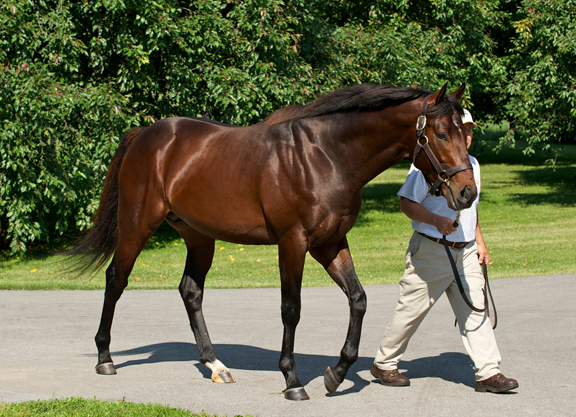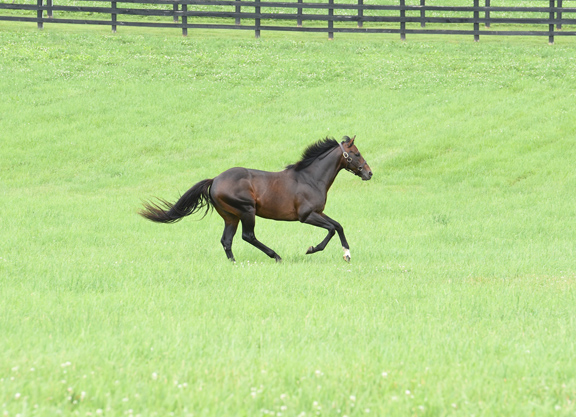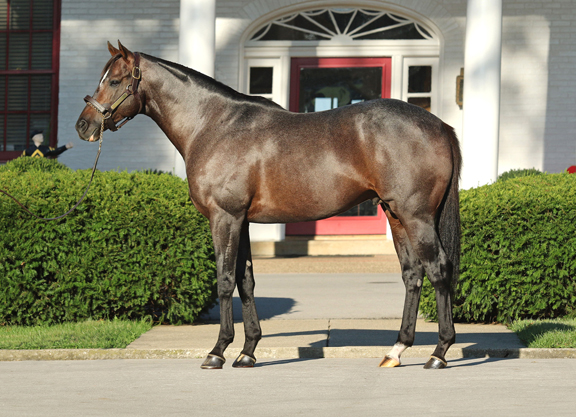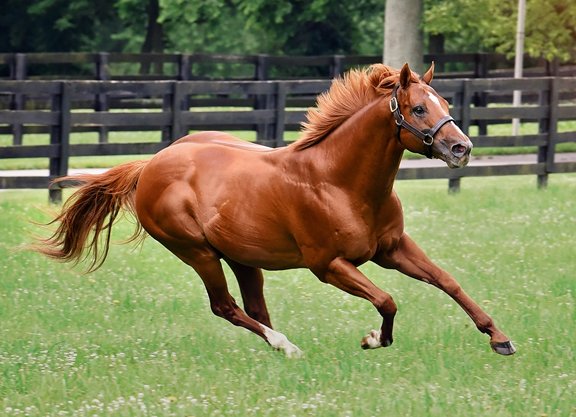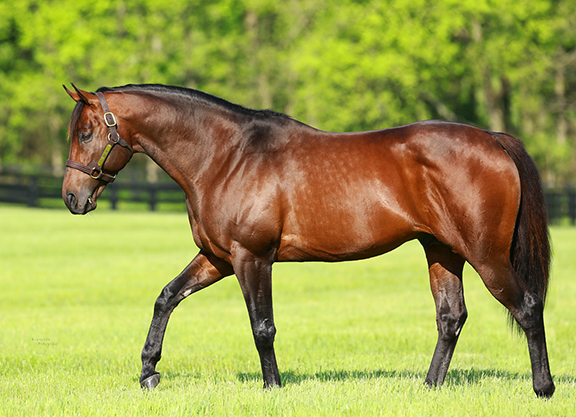By Chris McGrath
Today we come to a final group of stallions whose development we're treating separately, before wrapping up our series with a look at those survivors who made it across the highwire and can be grouped together as “Established Sires.” (After which we'll also be taking a tour of regional stallions.)
In the last couple of instalments, we've observed the Kentucky talent pool in each intake rapidly drying up, so that our review of third- and fourth-crop options respectively encompassed 18 and just six stallions. And we are left with a similar rump among those about to launch a fifth crop of juveniles, with only seven still advertising a fee in Kentucky.
No need, by this stage, to reprise yet again the familiar traps of the commercial model. Suffice to turn back the clock to 2016, not so long ago, when Orb (Malibu Moon–Lady Liberty, by Unbridled)–a Kentucky Derby winner from the family of Ruffian, standing for $25,000 on an exemplary, historic farm; one sagely resistant to the inundation of the market by more industrial rivals–dominated this group with a $148,318 average for his first yearlings. Unusually, moreover, he actually managed to elevate his second crop to a still higher yield at $184,006, when selling no fewer than 66 of 77 into the ring. The world was at his feet. In 2021 Orb is still clinging on at Claiborne, but listed as “private” after receiving a grand total of seven mares last spring.
Nobody's fault, and there are parallels on every farm. Conceivably Orb could yet pull a champion out of his hat. But such is the terrifying commercial vortex that consumes a young stallion who does not make an adequately purposeful start.
Nor, on the other hand, does even the briskest of beginnings guarantee lasting momentum. The champion freshman of this group was Overanalyze, whose 2018 book at WinStar promptly soared to 195. The following season, however, he had plummeted to 43 mares and last spring he was exported to Korea. Shanghai Bobby was on his way to Japan within the year of finishing third in the freshmen championship–despite having meanwhile produced a Royal Ascot winner from his second crop, which also turned out to include elite sprinter Shancelot. A year later Japan would also summon Animal Kingdom, who had finished fourth in the freshman table.
Yet this is also the intake that includes New Year's Day. Having been reduced to a couple of dozen mares at $5,000 in 2018, he was sold to Brazil four months before an upgraded claiming horse named Maximum Security gave him a first graded stakes success. The rest is history, and New Year's Day has since been given a fresh start in Japan.
What a chaotic environment, then, shaped more by luck than judgement, has been heroically negotiated by the handful in this class who have established a viable niche in the Kentucky market.

Violence | Sarah Andrew
As it happens, far and away their most consistent achiever has been a horse who was worn down in the GII Fountain of Youth S., which turned out to be his final start, by none other than Orb. Their fortunes have diverged in their new careers, with Violence (Medaglia d'Oro–Violent Beauty, by Gone West) at Hill 'n' Dale dominating on cumulative results by virtually all indices. He only missed Overanalyze by cents as a freshman, and has since maintained output for 21 black-type winners.
True, he had a quieter year in 2019, prompting an immediate reversal–back to $25,000 from $40,000–of the fee hike he had earned with his across-the-board second-crop championship, on the back of which he had sold his yearlings (conceived at $15,000) for a knockout average of $133,600. But his 2020 campaign has the look of a turning point, crowned not just by a first domestic Grade I winner but by three of them, from consecutive crops: Volatile in the Alfred G. Vanderbilt H., No Parole in the Woody Stephens, and Dr. Schivel in the Del Mar Futurity. Behind Speightstown's four elite scorers, only Into Mischief, More Than Ready and War Front shared this distinction in 2020.
The focus on speed in his elite trio is an interesting development. Violence's own sire, though by an avowed turf influence in El Prado (Ire), operated on dirt and has divided his impact, at stud, not only between surfaces but also between disciplines. And an aristocratic maternal family features a series of crossover influences: second dam by Storm Cat out of Hall of Famer Sky Beauty (Blushing Groom); third a half-sister to the flying Dayjur (Danzig); fourth by Nijinsky out of champion sprinter Gold Beauty (Mr. Prospector).
There will be no break in the traffic for Violence, whose sales performance reflects something of his own exceptional physique. The group of juveniles he is about to launch, indeed, graduate from a book of 214 mares and he only lost momentum after that quiet 2019, with 86 mares last year. You can bet that numbers will be back up now. After sliding to a yearling average of $44,649 with his 2019 blip, this time round Violence rallied to $72,128 for 66 yearlings sold of 88 offered–an especially good performance, of course, in the teeth of the pandemic economy.
I love that Violence's first two dams are both by sires, in Gone West and Storm Cat, out of daughters of Secretariat–whose half-brother Sir Gaylord is responsible for the damsire of El Prado. One way or another, Violence now has all bases covered and can keep consolidating.
If Violence has always seemed regal, his nearest pursuer in this group has seemed more like the plucky fellow fighting to earn his stripes. Doubtless that partly reflects the grave health challenges overcome by Paynter (Awesome Again–Tizso, by Cee's Tizzy) before he could resume at a high level as an older horse. But we should remind ourselves that he actually started out at WinStar off a higher fee ($25,000) than Violence.
For 2021, he has taken his fourth fee cut to just $7,500–pretty astonishing, really, when he had just been saluted as sire of the fastest miler in Keeneland's history. Now, of course, Knicks Go has followed up his GI Breeders' Cup Dirt Mile track record in the GI Pegasus World Cup, reiterating his ability to kick again from the front. But this dazzling renewal for the Brad Cox barn is actually the second time that Maryland-bred Knicks Go, whose family is seeded by some pretty exotic names, has demanded a fresh look at his sire.
With three-figure books across his first four seasons, Paynter had been given a solid base and his first yearlings were well supported. They made a fairly quiet start on the track the following year, however, reducing his next book to just 34 mares at half his opening fee. Neither Paynter himself nor his sire had raced at two, so it's hard to know quite what breeders were expecting. But then Knicks Go emerged from his second crop, first as shock winner of the GI Breeders' Futurity and then beating all bar Game Winner (Candy Ride {Arg}) in the GI Breeders' Cup Juvenile. That revived momentum for Paynter, who received 97 and 71 mares in the two years since, and the second coming of Knicks Go will surely repeat the dose at such a low fee.
Because actually Paynter has a solid spread of talent behind his flagship. Knicks Go, remember, sat out most of 2020 and his $608,440 earnings represented only 10 cents in every dollar banked by Paynter in overhauling even Violence, with his three Grade I winners, to top the fourth-crop sires table. Though we've seen that only a handful of elite stallions could match the icing on Violence's cake, their performance otherwise was very similar: Paynter had 222 starters, Violence 225; he had nine black-type winners, against eight for Violence; 18 black-type performers played 15; each had three graded stakes winners and six graded stakes horses; and they respectively notched 115 and 116 winners overall.
The gap between them, of course, remains the one that divides Knicks Go from the rest of Paynter's best stock. Graded stakes winner Harpers First Ride is doing his best, ten-for-18 overall after finishing tailed off in the Pegasus, but Paynter doesn't want Knicks Go to seem so freakish as to become as much of a burden as a benefit. That's why we should respect the breadth of his output, putting him in some pretty august company in the general sires list (among the top 20 active stallions last year).
Paynter's fee cut looks a sensible response to his virtual disappearance as a commercial force with his latest yearlings, processing a handful for a four-figure average. But he can turn that round, too, as people absorb the supporting cast behind his headline act. Either way he certainly looks attractively priced for anyone who might want to breed a runner. And remember his deeds all have an obvious genetic base: he's out of a full-sister to his farm's pensioned legend Tiznow.

Take Charge Indy | Louise Reinagel
This group contains one stallion who has actually managed to reverse the usual tide, Take Charge Indy (A.P. Indy–Take Charge Lady, by Dehere) having last year returned to WinStar after a three-year stint in Korea. He had been exported after a tepid reception for his first yearlings in 2016, leggy and immature as they often were, an average of $40,422 representing a limited yield for a rookie who had started out at $20,000.
The three crops he left behind, however, turned out to include the likes of GII Rebel S. winner Long Range Toddy, GII Louisiana Derby winner Noble Indy and GI Preakness S. runner-up Everfast. In 2018, Take Charge Indy finished runner-up in the second-crop table; and the following year he edged out Paynter to top the third-crop championship with five black-type winners. He only mustered one of those last year, but obviously had no juvenile input in play.
He was welcomed back by 144 mares last spring, at $17,500, and a mild trim to $15,000 suggests confidence that breeders will be following through on a pedigree that unites a breed-shaping stallion with a top-class runner who has since become a Broodmare of the Year (also responsible, of course, for Three Chimneys sire Will Take Charge). As with Violence, we get a double dose of Secretariat's daughters through Weekend Surprise, the dam of A.P. Indy, and Sister Dot, who gave us Take Charge Lady's sire Dehere. Indeed, the whole page is saturated with Classic influences and, if his GI Florida Derby success could not disguise the reality that he raced one peg below the very best, then Take Charge Indy could well become one of those whose genes make him eligible to produce runners still better than himself.
That remains to be seen. Strictly, Take Charge Indy still needs his big horse–but the bottom line is that his black-type winners and performers have come at a clip slightly better than both Violence and Paynter. Obviously he has a problem in that there will be few if any headlines coming off the track for a couple years now, so he may need the market to invest his relaunch with something of the glamour generally reserved for total newcomers. But he should be treated with more respect than those, having already demonstrated his competence in the role. And the Classic complexion of his overall pedigree should especially appeal to anyone prepared to retain a filly.
Another nugget of old-fashioned virtue, and who happens to be even more closely related to a rival in this intake, is Oxbow (Awesome Again–Tizamazing, by Cee's Tizzy) at Calumet. He is by the same sire as Paynter and his dam, like Paynter, is another sister to the great Tiznow. Both horses, moreover, finished second in the GI Belmont S. But Oxbow did so after winning the GI Preakness and running sixth in the Derby, and earlier won the GIII Lecomte S. by 11 1/2 lengths. Unfortunately he derailed in his next start, but he had left no doubt as to his throwback, speed-carrying capacities and you'd be confident that his stock will mature effectively.
That's important, because his sophomores this year represent a book of 187–and they include none other than Hot Rod Charlie, 94-1 runner-up in the GI Breeders' Cup Juvenile. So these might just keep him in the game after he was reduced to a very small book last year, duly trimmed to $7,500 (opened at $20,000). His percentages are unexciting and he appears to have rather shot his bolt as a commercial sire, but that won't stop him producing another Coach Rocks (GII Gulfstream Oaks) or two.
Jimmy Creed (Distorted Humor–Hookedonthefeelin, by Citidancer) represents a very different firm, in Spendthrift. But actually he has so far had nothing like the kind of industrial output sometimes associated with that farm, while having quietly established himself as a most consistent operator at $10,000, temptingly down from $15,000. In fact, his lifetime ratio of black-type winners and performers to named foals (5.2% and 11.5% respectively) is ahead of all these, even Violence (4.5% and 8.7%).
That makes him a really interesting proposition, as a lively start with his first juveniles (20 winners from 44 starters) turned round his book from 67 in 2017 to 165 in 2018. That gives him a big team of juveniles for the year ahead, including yearlings that sold for as much as $500,000 and an average $46,125, while he had another 253 covers across the next two years to keep the pipeline full. In other words, foals conceived now can hope to ride renewed headlines on the track, where he has already produced four graded stakes winners/four Grade I horses. It's all perfectly feasible of a GI Malibu winner whose dam and half-sister Pussycat Doll (Real Quiet) both won the GI La Brea S.
Another by the same sire, Alternation (Distorted Humor–Alternate, by Seattle Slew) resembles Paynter with Knicks Go in needing to show that it is not all about GI Kentucky Oaks winner Serengeti Empress. Yes, he only has one other graded stakes winner to this point, but eight black-type scorers overall is a respectable percentage of only 199 named foals.
By this stage he's not really pretending to be a commercial sire but the 40 mares he entertained at Pin Oak last year were sent in the knowledge that his half-brother Higher Power (Medaglia d'Oro) has now earned a place at Darby Dan as a runaway winner of the GI Pacific Classic. Their dam is a half-sister to Canadian Horse of the Year Peaks and Valleys (Mt. Livermore) and it's a regal family all round. He has done it once and, given the chance, there's no reason why he shouldn't do it again.
The only other stallion apparently advertising a fee in Kentucky from this group is Raison d'Etat (A.P. Indy–Sightseek, by Distant View) at Calumet, off the bargain peg of $2,500. He is trading primarily on his genes, rather than the limited use he made of them on the track, but has vindicated the theory to a modest degree with a couple of stakes winners so far.
Bottom line is that some of these survivors may have a lean and hungry look, but they're a deserving bunch overall and much better value than almost all the unproven stallions who dominate the market. Here's hoping they consolidate and can earn a place, next time round, in our concluding look at Established Sires.
CHRIS McGRATH'S VALUE PODIUM: Fourth- & Fifth-Crop Sires
Gold: Paynter ($7,500, WinStar)
Good base behind his headline act, yet cost shrinking
Silver: Cairo Prince ($15,000, Airdrie)
Star of his class now a tempting fee
Bronze: Jimmy Creed ($10,000, Spendthrift)
Pipeline is loaded.
Not a subscriber? Click here to sign up for the daily PDF or alerts.





